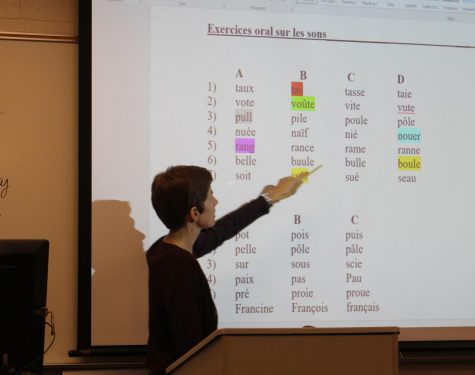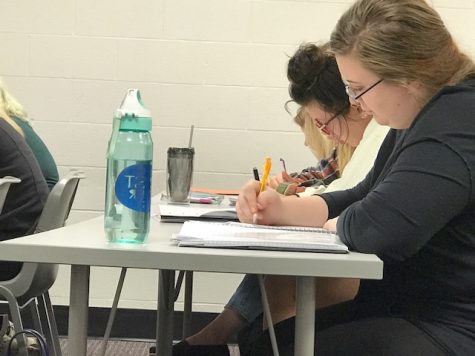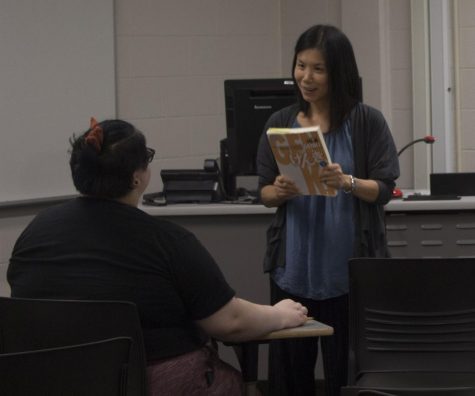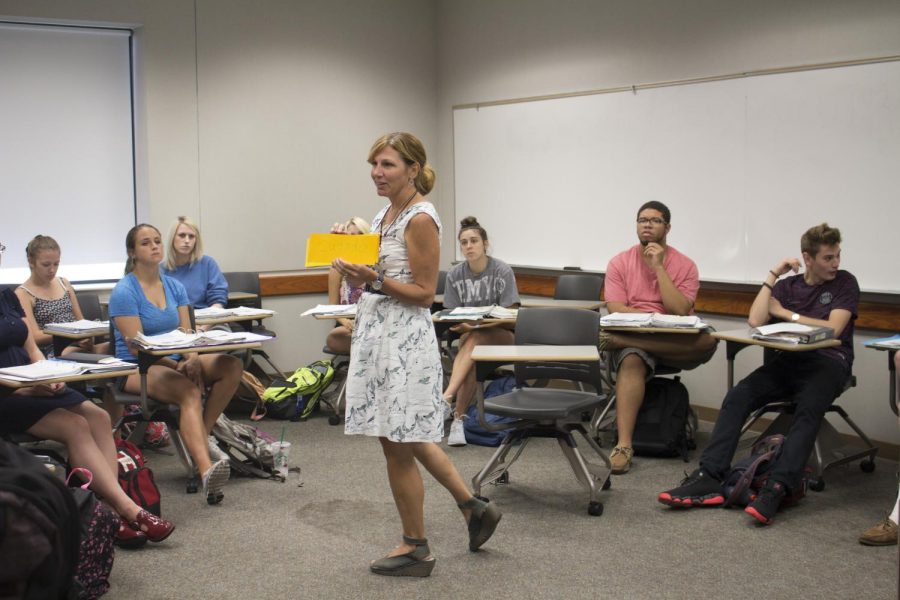Benefits of Multilingualism
Professor Zink demonstrated to her students the conjunctions within the Spanish language as they study for their upcoming exams.
October 5, 2017
Colleges across the United States require students to undertake a certain amount of credits toward a foreign language. Those who take a foreign language discover that acquiring the skills to speak a second – if not third – language give a new aspect on life and what it may bring.
One of the top grievances among students for their degree requirements is a foreign language credit. Degrees often require students to take up to four foreign language classes in four separate semesters, which makes it almost impossible to avoid foreign languages.
IU Southeast offers French, German, Spanish and Japanese as foreign languages to satisfy degree requirements. However, there are 6,909 languages on Earth according to the Linguist Society.
There’s no way for students to know every single language on this planet, but being fluent in at least one foreign language can open up opportunities. The four languages IU Southeast offers cover different parts of the world that have affected this nation in one way or another. It would be practical to speak their language and converse with their residents.
IU Southeast professor Melissa Miller discovered that she wanted to teach French and Spanish from an early life experience. Miller’s family hosted a French foreign exchange student in their home and the French she learned from this student grew an interest within her to learn a foreign language. It wasn’t until high school when her foreign language teachers inspired her to teach the language.

Due to her love of traveling, Miller believes knowing another language can open doors to communicate with others outside of the U.S.
“I volunteer at Churchill Downs as a side job,” Miller said. “I find it very gratifying and rewarding when you can talk to people and communicate with people from other cultures and learn what they are about.”
Being fluent in another language can bring students closer to other cultures as well as open up job opportunities, as employers look for something to distinguish them from other applicants.
“At McDonald’s, it made a significant difference in my daily life,” said Jazmin Bader, Spanish senior at IU Southeast. “I was the only fully bilingual member of the staff, so all of the translation fell to me including being yanked up front to handle a customer or to sit in on a reprimanding meeting. I spent many days speaking fully Spanish and going home to see if I could remember how to form a sentence in English.”
Since Bader took an interest in foreign language, she said she focuses solely on expanding her vocabulary and expression of specific and complicated topics.
“I learn other languages because the way another language uses each and every word is radically different despite translating the same way,” Bader said. “These things create an appreciation and discernment for small differences in meaning. Each of these allows me to better communicate with the world around me.”
Bader is an example of a student who has embraced bilingualism, or the capacity to speak two languages. Multilingualism, however, is the ability to use several languages proficiently, if not fluently.
Quintera Quinn, a senior at IU Southeast majoring in English, is self-taught in foreign languages. When she was eight-years-old she would run to the computer to learn new phrases in multiple languages. Since then, her multilingualism has blossomed; she is an avid speaker in French and Korean with a beginner’s level in Spanish, Chinese, Ukrainian and Swedish.
Quinn said learning a foreign language offers more skills beyond knowing a new language.
“Learning other languages requires a great deal of discipline which can cascade into other disciplines. It can also make someone more open-minded,” said Quinn. “I also just generally enjoy languages, so I study them daily.”
Senior lecturer in Spanish at IU Southeast, Amy Zink, said she realizes not only the sense of accomplishment that comes with self-discipline but also the cognitive benefits of learning a new language.
“The process involved in learning a foreign language is excellent for the brain,” Zink said. “Students learning a language are working not only on speaking but also on listening comprehension, writing and reading and critical thinking, all in the same course.”

When students learn a second language, they reap cognitive benefits, such as decision making, problem solving, multitasking and improved writing skills.
The United States has five major language groups, according to the Census Bureau; Spanish is the second most used language in the nation after English. Learning another language can help students obtain job opportunities, cognitive growth or a student’s learning experience during college. Fluency in a foreign language can also help students understand life differently by being exposed to other cultures.
A common concern among college students is whether or not a foreign language is an asset for everyday life. For students whose job doesn’t require them to speak to people from different countries, the purpose of knowing a second language is unclear.
Although a student herself, Quinn uses her foreign language proficiency to teach English to others.
“I help others learn English. For my French and Korean students, I sometimes translate words or phrases for them,” said Quinn. “I also have pen-pals in other countries.”
Zink often uses Spanish outside the classroom, “I travel almost every year to Spanish speaking countries. Many of my hobbies and pastimes have something to do with language, culture, literature, film or volunteering with refugees for example.”
Within all learning levels, the amount of students in the U.S. studying a second language is declining. Former U.S. Secretary of Education Arne Duncan said, “Americans need to read, speak and understand other languages to prosper economically and to improve relations with other countries.”

According to Duncan, Europeans are often fluent in multiple languages, unlike Americans. He said people from various parts of the world come to the U.S. to bring about a change in their life, whether it be financially, spiritually or for other reasons.
Duncan said more students in America should want to talk to people from another country in order to help, make a change or at the least be able to say hi and that unfortunately, students don’t seem to realize the importance of communicating with others.



